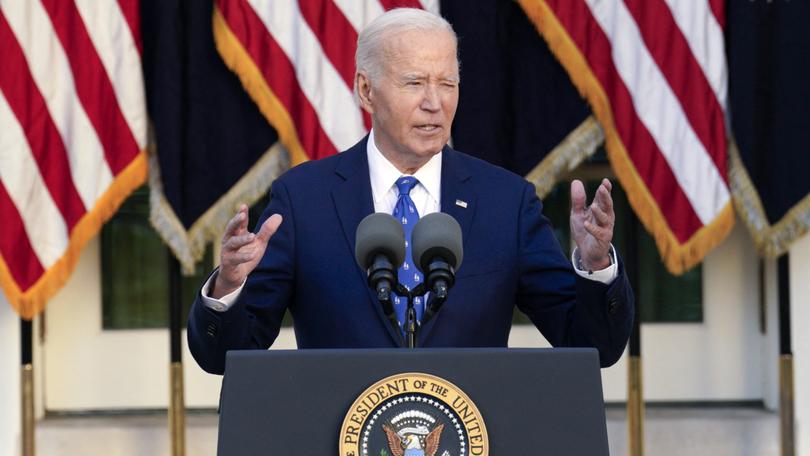Israel-Hezbollah ceasefire: Truce deal struck for fighting in Lebanon as Benjamin Netanyahu issues warning
Outgoing US President Joe Biden has confirmed a ceasefire deal has been reached between Israel and Hezbollah.

Outgoing US President Joe Biden has confirmed a ceasefire deal has been reached between Israel and Hezbollah.
Prime Minister Benjamin Netanyahu made an address to the nation confirming the deal on Tuesday evening local time, saying his cabinet had agreed to end fighting with the terrorist group in Lebanon.
Mr Biden formally announced the deal, which was brokered by France and the U.S.
Sign up to The Nightly's newsletters.
Get the first look at the digital newspaper, curated daily stories and breaking headlines delivered to your inbox.
By continuing you agree to our Terms and Privacy Policy.“Under the deal reached today, effective at 4:00 a.m. tomorrow, local time, the fighting across the Lebanese Israeli border will end,” Mr Biden said in the White House Rose Garden.
“This is designed to be a permanent cessation of hostilities,” he added.
“What is left of Hezbollah and other terrorist organizations will not be allowed, I emphasize, will not be allowed, to threaten the security of Israel again.”
Mr Netanyahu spoke to Israeli citizens earlier after convincing his cabinet to agree to the deal, saying: “Hezbollah is no longer the same. We set them back decades.”
“We have destroyed many missiles and rockets, we have killed many terrorists.
“The duration of the ceasefire depends on what happens in Lebanon.”
Despite cause for calm, Mr Netanyahu issued a warning in his acknowledgement of the deal, saying ”an agreement can be enforced and we will enforce it”, adding “if Hezbollah violates it, we will attack.”
“I hear the claim that we cannot renew the war. I remind you - this is precisely what I was told during the ceasefire in Gaza, and we returned to fight, and in a big way.”
Foreign Affairs Minister Penny Wong has welcomed the ceasefire deal between Israel and Hezbollah, saying she hopes it’s a “catalyst for a broader ceasefire in the region”.
“We look forward to the day when there is a ceasefire too in Gaza,” she said.
“We’ve been calling for a ceasefire in Gaza for over 11 months now. And we see every week the death toll rising, more children, more women. We again join with the overwhelming majority of the international community to urge a ceasefire in Gaza.
“But today we are very pleased to see that there is a ceasefire with Hezbollah and that the people of Lebanon and Israel can know some peace.”
She said Australia would continue to advocate for a ceasefire in Gaza.
The ceasefire comes after Israel unleashed a fury of strikes in Beirut overnight night, with multiple deaths recorded.
Israeli strikes have pounded a densely-populated part of the Lebanese capital and its southern suburbs, hours ahead of an anticipated announcement of a ceasefire ending hostilities between Israel and Lebanese armed group Hezbollah.
A strike on Beirut hit the Noueiri district with no evacuation warning and killed at least one person, Lebanon’s health ministry said in a preliminary toll.
Minutes later, at least 10 Israeli strikes hit Beirut’s southern suburbs.
They began approximately 30 minutes after the Israeli military issued evacuation orders for 20 locations in the area, the largest such warning yet.
As the strikes were under way, Israel’s military spokesperson Avichay Adraee said the air force was conducting a “widespread attack” on Hezbollah targets across the city.
Hezbollah began firing into northern Israel, saying it was showing support for the Palestinians, a day after Hamas carried out its October 7, 2023 attack on southern Israel, triggering the war in the Gaza Strip.
Israel returned fire on Hezbollah, and the two sides have been exchanging barrages ever since.
In early September, Israel escalated its campaign of bombardment and sent troops into Lebanon, vowing to put an end to Hezbollah fire.
More than 3760 people have been killed by Israeli fire in Lebanon the past 13 months, many of them civilians, according to Lebanese health officials.
The bombardment has driven 1.2 million people from their homes.
Israel says it has killed more than 2000 Hezbollah members.
Hezbollah fire has forced about 50,000 Israelis to flee homes in the country’s north and its rockets have reached as far south in Israel as Tel Aviv.
At least 75 people have been killed, more than half of them civilians.
More than 50 Israeli soldiers died fighting in the ground offensive in Lebanon.
- With Reuters and CNBC
